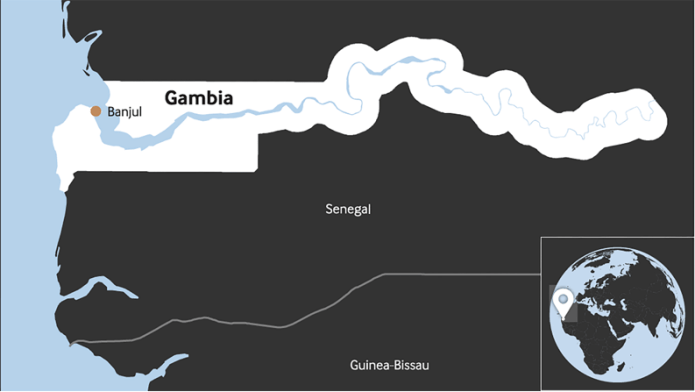Adama Barrow, president of Gambia, inherited more than a traumatised population after unseating the brutal autocrat Yahya Jammeh in 2017. During his almost two decades in power, characterised by human rights abuses, corruption and poor governance, Mr Jammeh ran Gambia’s economy into the ground. Mr Barrow, a former real estate developer, promised to restore trust and spur investment.
Part one is going well. According to the Mo Ibrahim Foundation, Gambia witnessed Africa’s biggest governance improvement in the decade to 2021. But dragging its agriculture-dependent economy into the 21st century has proved more challenging, particularly following the dual economic shocks of Covid-19 and the Ukraine war.
Now, though, digitisation and business-friendly reforms could be the country’s ticket to growth, according to ministers, investors and a new breed of Gambian start-ups. The strategy received a major boost last year when African mobile money platform Wave established a presence in the country. And in March, the country’s capital city, Banjul, joined the Digital Cooperation Organisation, which unites African and Gulf states to create a common digital economy.
“We see tremendous potential for growth in Gambia,” says Ben Kolesar, who launched the Gambian operations of fintech Wave, which hopes to draw poor Gambians into the financial system. “Gambia is a crossroads within West Africa.”
Looking for investors
Gambia, which has 2.6 million inhabitants and a $1.95bn economy, according to the IMF, is a narrow strip of land running along the Gambia river and surrounded by Senegal on three sides, and the North Atlantic to the east. Its modern-day geography traces back to the colonial era and an agreement between France and the UK in 1889. Known as the ‘Smiling Coast’, the Anglophone country is the smallest nation in mainland Africa, covering just 11,300 square kilometres — around the size of the US state of Maryland.
After comfortably securing re-election last year, Mr Barrow launched a green-focused national development plan to grow the private sector by 2027 by leveraging Gambia’s comparative advantages. In their sales pitch, Gambian officials talk up recent strides in electricity access, infrastructure development, tourism, governance and technology. Yet the country has struggled to attract investment in recent years.
“Investment was picking up, but we experienced Covid, which made businesses sit back,” Ousainou Senghore, CEO of the Gambia Investment and Export Promotion Agency (Giepa) tells fDi Intelligence. “In addition, we have the Ukraine crisis. But these are things that we, as a country, see as opportunities.”
Among a package of new investment-friendly policies, Gambia is making it easier for agriculture investors to purchase agricultural land and access tax breaks in priority sectors like agriculture, manufacturing and ICT.
“If you look at mainland Africa, Gambia is one of the most stable and peaceful countries in this region,” Mr Senghore says. “Yes we have challenges in terms of access to finance, but we are working on that now.”
“The country’s relatively good governance, as well as its reform process have already won over some investors,” says Wave’s Mr Kolesar.
Last year Gambia saw $197m in total inbound FDI, according to Giepa. In addition to Wave, Turkish firm Negmar announced plans to build a 24-hour ferry service in the Gambia river that bifurcates the country, which will move goods, people and services. Meanwhile, the African Development Bank expects the Gambian economy to grow by 5.8% this year.
A host of new businesses are also springing up, heralding a quiet tech revolution. They include Taybull, a digital wallet and payment service. “We are sort of catching up a bit to the rest of Africa,” said Kumbale Goode, its CEO. “Most microbusinesses in Gambia are now based online.” Ms Goode says a cheap labour market and an open government are slowly making the country an attractive investment destination.
Sensing an economic shift, Mr Barrow’s government is embarking on a digitisation drive of its own, confirmed by Gambia’s admission to the Digital Cooperation Organisation last month. With Nigeria, Rwanda, Morocco, several Gulf states and Pakistan, the body represents a market worth nearly $2tn and a market of around 600 million people.
Challenges remain, though. With high poverty levels, Gambia has a large skills gap and a wide digital divide, exacerbated by expensive, low-quality broadband access. In addition, it still lacks a business hotel and conference centre, with its accommodation offering skewed towards beach resorts, where the country has been able to attract big international names such as Thomas Cook.
That, too, could be about to change. Last year, the government signed a public–private partnership to develop a large hotel on the outskirts of Banjul. Currently in discussions to potentially add the project to its stable is Radisson, which has a reputation for taking gambles in Africa. “We always take pride in being the first to enter a country with hotels that are able to catalyse growth,” says Ramsay Rankoussi, Radisson’s vice president for development in Africa and Turkey.
“We would certainly want to take the bet [in Banjul],” Mr Rankoussi adds.





